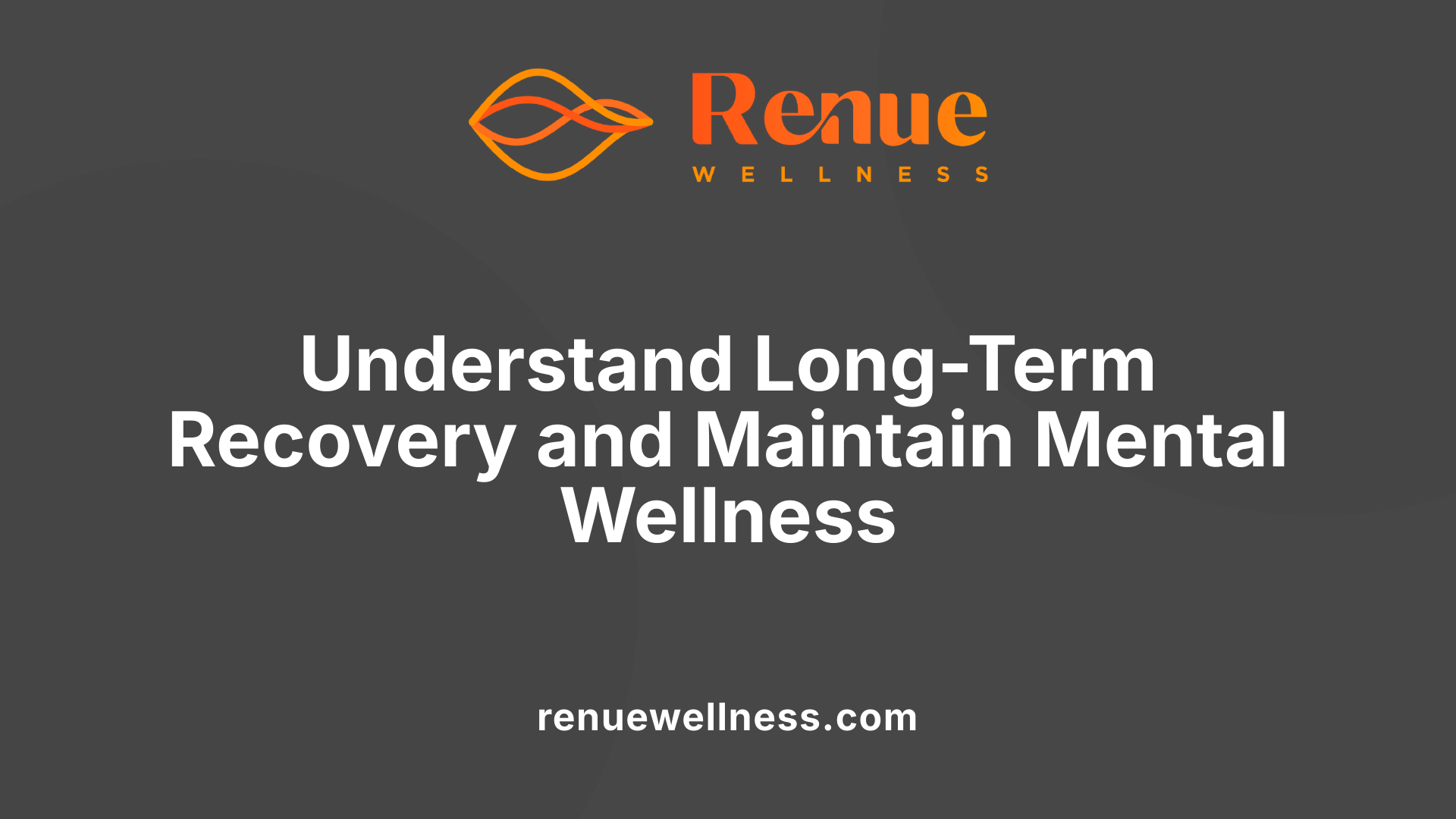How to Set Recovery Goals After Depression Lifts


August 20, 2025
A Pathway to Lasting Recovery and Personal Growth
Recovery from depression is a multifaceted journey that requires careful planning, consistent effort, and self-compassion. Setting meaningful, achievable goals is essential for maintaining mental health, rebuilding confidence, and fostering a fulfilling life. This article explores effective strategies for establishing recovery objectives, lifestyle adjustments to support sustained wellness, and techniques to navigate the ongoing process beyond the lifting of depressive symptoms.
Understanding Recovery Signs and Progress Indicators

What are common signs of recovery from depression?
Recovery from depression is a gradual process, and recognizing its signs helps individuals and their support systems to gauge progress. Some of the most evident signs include an overall improvement in mood. People may feel less sadness or irritability and exhibit a decreased sense of overwhelming emotions.
Increased energy levels are another key indicator. As recovery progresses, individuals often find it easier to engage in daily activities such as work, hobbies, or social interactions. They might notice better sleep patterns, an increase in appetite, and a renewed interest or enjoyment in previously liked activities.
Cognitive functions tend to improve as well. Improvements in concentration, decision-making, and problem-solving abilities are common. Negative thought patterns may lessen, replaced by a more positive outlook.
Physical signs of progress can include the return of libido, healthier self-esteem, and a decrease in social withdrawal. These signs collectively signify that mental and physical health are stabilizing.
Monitoring these signs over time is crucial, as recovery from depression is often not linear. Consistency in attending therapy, sticking to medication regimes if prescribed, managing stress, and making healthy lifestyle choices further support sustained improvement.
Recognizing these signs allows individuals and caregivers to celebrate milestones and seek additional support when progress plateaus or reverses. Overall, a steady, gradual reduction in symptoms combined with enhanced functioning and well-being signals meaningful recovery.
The Process of Recovery and Effective Goal Planning

What is the process of mental health recovery and goal planning?
Recovery from mental health issues is a gradual and often nonlinear journey. It involves managing symptoms, building resilience, and creating a fulfilling life despite ongoing challenges. Recovery is not just about eliminating symptoms but also about restoring a sense of purpose, hope, and connection.
A vital aspect of this process is setting goals that are tailored to the individual's personal strengths, needs, and motivations. This is achieved through collaborative planning between individuals and healthcare professionals. Together, they identify realistic, measurable objectives across different areas of life such as symptom management, social relationships, employment, education, and housing.
Effective goal planning involves several stages:
- Negotiation: Personal preferences and priorities are discussed to ensure goals are meaningful.
- Setting: Clear, specific goals are established, often using the SMART framework—making goals Specific, Measurable, Achievable, Relevant, and Time-bound.
- Action: Individuals take steps toward achieving their goals, supported by appropriate tools, resources, and encouragement.
- Evaluation: Regular review of progress allows for adjustments, ensuring goals remain relevant and attainable.
Since recovery is a personal process, the goals should be flexible to accommodate setbacks or changes in circumstances. Support systems, including family, friends, peer groups, and health professionals, are essential for motivation, encouragement, and resilience. They help maintain a positive environment and reinforce commitment to ongoing recovery.
In essence, recovery prioritizes person-centered care, emphasizing empowerment, self-efficacy, and sustained effort. It recognizes that while mental health issues may not be fully cureable, living a meaningful, autonomous life is an achievable and worthwhile goal.
Trajectories of Recovery and Long-Term Management

How does mental health recovery progress over time from depression?
Recovery from depression does not follow a straight line; it is a gradual journey that varies from person to person. Initially, many individuals experience a phase of acceptance, acknowledging their condition and beginning to engage with treatment options like therapy, medication, or lifestyle changes.
As recovery continues, people often reach a stage of transformation and adaptation. This phase involves learning new coping skills, adjusting routines, and finding ways to manage symptoms effectively. It is common to encounter setbacks, especially when symptoms such as fatigue, negative thought patterns, or physical impairments recur. Patience and persistence are vital.
Effective recovery requires a personalized approach, incorporating psychological support, healthy lifestyle choices, and stress management techniques such as mindfulness or regular exercise. Importantly, strong social support networks—family, friends, peer groups—play a significant role in maintaining progress.
Since depression has a high likelihood of recurrence, ongoing treatment and lifestyle adjustments are necessary even after symptoms improve. Long-term management strategies can include consistent medication adherence, continued therapy sessions, regular physical activity, balanced nutrition, and establishing routines that promote mental well-being.
Some individuals recover fully within weeks or months, while others may experience longer periods of fluctuating symptoms or multiple episodes. This underscores the importance of continuous care, relapse prevention plans, and community involvement to sustain wellness over time.
Ultimately, maintaining mental health post-depression involves recognizing that recovery is an ongoing process, requiring flexibility, proactive strategies, and vigilant support systems to navigate the evolving challenges.
Setting Personal and Recovery Goals with Practical Strategies

How can I establish personal and recovery goals after depression lifts?
After overcoming a depressive episode, setting clear and attainable goals is essential for maintaining progress and fostering a fulfilling life. To do this effectively, many professionals recommend using the SMART goal framework, which emphasizes creating Objectives that are Specific, Measurable, Achievable, Relevant, and Time-bound.
Begin by identifying small, manageable steps that build your confidence. For example, start with daily routines like getting out of bed at a consistent time, practicing mindfulness, or attending a support group. These short-term goals serve as building blocks for larger life aspirations, such as reconnecting with loved ones, pursuing education, or advancing your career.
Balancing immediate actions with long-term vision helps maintain motivation and provides a sense of purpose. Regularly reassessing your goals allows you to stay flexible and adjust based on your evolving needs and circumstances. This flexibility prevents overwhelm and enables sustained progress.
Support networks, including friends, family, and mental health professionals, play a vital role in goal achievement. Sharing your goals and progress can motivate you and provide encouragement. Additionally, journaling your experiences helps track changes over time, reflect on setbacks, and celebrate successes.
Ultimately, goal-setting is a dynamic process. Staying patient, practicing self-compassion, and adapting your plans as needed are crucial steps in your ongoing recovery. By establishing personalized, achievable objectives and maintaining a flexible approach, you can foster resilience and continue to build a healthier, more satisfying life post-depression.
Effective Techniques for Goal Setting During Recovery

What are some tips and techniques for effective goal setting during depression recovery?
Setting meaningful and attainable goals is essential for progress during recovery from depression. Using structured frameworks like SMART—Specific, Measurable, Achievable, Relevant, and Time-bound—helps individuals establish clear targets that are realistic and motivating.
Breaking larger goals into smaller, manageable steps prevents feeling overwhelmed and fosters a sense of achievement with each milestone. For example, an initial goal might be to get out of bed by a certain time or to practice mindfulness daily.
Focus on behavioral, emotional, and social objectives. Activities such as engaging in regular exercise, reconnecting with friends, or practicing self-compassion contribute to overall well-being. Incorporating these aspects into goals provides a balanced approach to recovery.
Engage support from healthcare providers, supportive friends, or family members. Sharing your goals and progress increases accountability and provides encouragement. Writing down your objectives helps clarify intentions and serves as a visual reminder.
Flexibility is vital in mental health recovery. Be willing to adjust goals as circumstances change or as you learn what works best. Celebrating small successes along the way boosts motivation and sustains effort.
In summary, effective goal setting involves a combination of structured planning, breaking tasks into digestible parts, focusing on various aspects of health, involving support systems, remaining adaptable, and acknowledging progress. These strategies foster a proactive and positive mindset conducive to long-term recovery.
Lifestyle Changes that Foster Sustained Wellbeing
What lifestyle changes can support recovery from depression?
Supporting recovery from depression often involves adopting lifestyle habits that promote mental and physical well-being. Incorporating regular physical activity, such as walking, cycling, or yoga, can significantly uplift mood and help lessen depression symptoms by releasing feel-good endorphins.
A balanced diet focusing on vegetables, fruits, lean proteins, and whole grains can improve overall health and provide essential nutrients that support brain function. Establishing a consistent sleep schedule and practicing good sleep hygiene can also enhance mood and energy levels.
Avoiding substances such as alcohol, recreational drugs, and nicotine is vital, as their use may worsen depression symptoms or interfere with treatment progress. To manage stress and foster relaxation, techniques like mindfulness, meditation, and other stress-reduction activities are recommended.
Exposure to sunlight or light therapy can boost serotonin levels, especially beneficial for seasonal affective disorder, a form of depression. Building social connections through community engagement or support groups provides emotional support and reduces feelings of isolation.
Finally, engaging in hobbies or creative pursuits helps cultivate joy and a sense of purpose, contributing to a sustained improvement in mental health. These combined lifestyle practices serve as a foundation for long-term recovery and resilience.
Sustaining Growth and Resilience in the Journey Ahead
Recovering from depression is an ongoing process that extends beyond symptom remission. By setting well-structured, achievable goals, maintaining healthy lifestyle habits, and continuously reassessing your progress, you lay a solid foundation for a resilient and fulfilling life. Remember that setbacks are normal, and flexibility in your approach allows you to adapt to life's ebbs and flows. Building supportive relationships, engaging in meaningful activities, and practicing self-compassion are vital components of long-term mental health sustainability. With perseverance, patience, and the right support, you can forge a purposeful path of ongoing growth and wellness.
References
- Living with - Depression in adults - NHS
- Blog – Depression after rehab | Main Line Health
- Depression and anxiety: Exercise eases symptoms - Mayo Clinic
- Adjusting Your Life for Recovery From Depression - WebMD
- Goal Setting in Addiction Recovery Tips and Real-Life Examples
- Setting Realistic Recovery Goals - Ashley Addiction Treatment
- Depression Recovery: How to Know You're Making Progress
Recent Posts
Conditions Treated
AnxietyDepressionOCDPTSDPostpartum DepressionPain ManagementSubstance AbuseSuicidal IdeationOur Location


